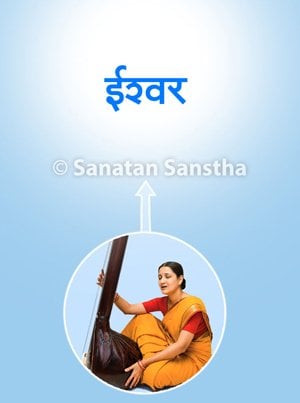
1. Importance of practicing music
‘Music is a gift from God. It is said that only one with Divine grace is able to sing. However with the ability of performing willful actions (kriyaman) God has given all the strength to pursue dreams. Even if you have an average voice if you rehearse rigorously then there will not only be a change in your voice but the voice can even attain heights in music.
2. Actions in practice of music
Practice can be done step wise as given further.
2 A. Practicing recitation of ‘Om’
While learning music in the initial three months practice recitation of Omkar for atleast half an hour before practicing notes .
2 B. Practice of sargam (musical notes) and
aroha-avaroha (ascending and descending notes in a raga)
1. If more time is available for practice then rest for 5 minutes after practicing Omkar and then practice the sargam, aroha-avaroha at a slow speed for half an hour. Ensure that the pace is slow, not fast.
2. When practicing the sargam pay full attention to whether the tune is accurate. If it is not perfect then try to perfect it with repeated practice. In music perseverance is important. When learning music in the initial stages you require tremendous control.
2 C. Practicing low pitched (kharja) notes
In music practice of low pitched notes is considered the best. By practicing them notes acquire depth and the ability to sing in high pitch develops. Though this is a little tough if done between 5 and 6 a.m. then it is easier. A good singer should be able to sing in all seven notes and to achieve that the only way is practicing in the low pitch. Hence this practice should be wholehearted and consistent, done daily as self-discipline and spiritual practice.
2 D. How to develop physical ability to the fullest with practice
Perform pranayam (regulated breathing) for atleast half an hour daily. When singing associate the seven notes with four parts of the physical body viz. abdomen, lungs, throat and upper part of the head. If bhasrika, bhramari and kapalbhati pranayams are performed daily then certainly a remarkable change will occur in you. You should experience this yourself.
3. Duration for which music practice is essential
3 A. For how long should music be practiced and for how much time ?
Often those learning music ask for how long they need to practise music. In reality practice never ceases for a true music learner and no amount of practice is in excess. This is the eternal truth continuing since ages.
3 B. When to rest during music practice
If you have been rehearsing daily and effectively then after 10 to 15 days of continuous practice you may rest for a day. This helps in relaxing the body thus providing more energy to continue further practice.
3 C. Duration of practice of notes
During practice if you find it difficult to start the song then till then concentrate only on practice of notes. Do not concentrate on singing or ragas. When you are able to sing the seven notes both ascending and descending, in tune, instead of seeking external support of any kind if notes are in the appropriate pitch then it is an indicator that you can go one step ahead towards singing a raga.
4. Benefits of practicing music
One becomes prepared for the following steps due to regular practice of music.
A. Energy of breathing and control gets steadied.
B. Cells in the voice develop the strength to bear the rise and fall in pitch of singing.
C.The ears and brain become capable of identifying notes grossly.
D. Due to the mind and internal thought process courage, concentration, purity and positivity required for singing, develop.
To become a good singer it is necessary to develop oneself at all these four stages.
5. Self Study and listening to good music is also a part of music practice
Practice of music also includes Self study of music and listening to good music. Listen to music of good classical singers through the internet or audio compact discs. After listening to music when the mind accepts, a thought process becomes firm.
6. There should be a connection between
practice of music and various acts in the daily code of conduct
During practice do not keep your schedule too tight, tense and difficult as it will not fulfil your objective of practice. Maintain a balance in other things besides learning music.
7. Guidance from the Guru is essential
When putting all above points into practice guidance from the Guru is extremely essential. In fact practising notes and introducing and developing a raga (alap) is extremely essential under the guidance of a Guru at least for a few years.’

 A research by British University shows how music is useful to reduce pain and to...
A research by British University shows how music is useful to reduce pain and to...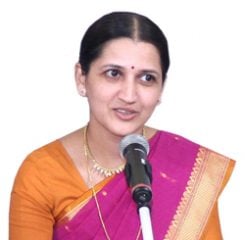 Guidance given by Paratpar Guru to Sadguru (Mrs.) Anjali Gadgil, from time to time regarding...
Guidance given by Paratpar Guru to Sadguru (Mrs.) Anjali Gadgil, from time to time regarding...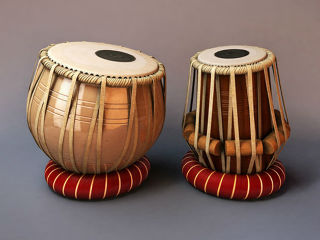 Origin of Bharatiya classical music and its spiritual features
Origin of Bharatiya classical music and its spiritual features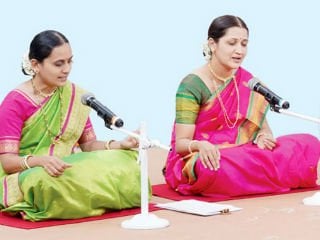 Invaluable guidance with respect to singing done by Sadguru (Mrs.) Anjali Gadgil
Invaluable guidance with respect to singing done by Sadguru (Mrs.) Anjali Gadgil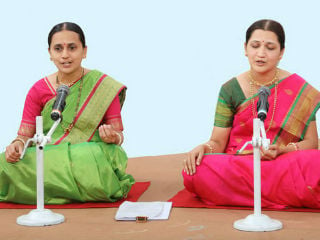 Science underlying the closure and opening of eyes of two lady seekers who sang at...
Science underlying the closure and opening of eyes of two lady seekers who sang at...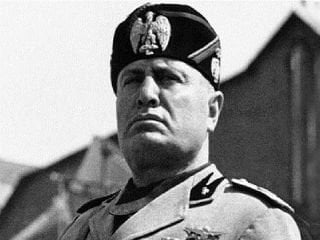 Italian dictator Benito Mussolini overcame sleeplessness by listening to Bharatiya Classical music
Italian dictator Benito Mussolini overcame sleeplessness by listening to Bharatiya Classical music